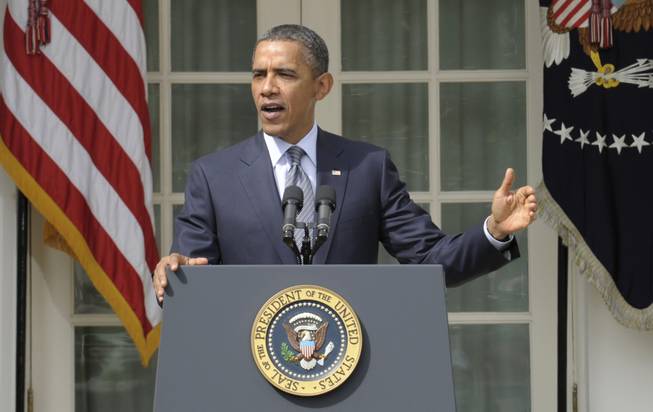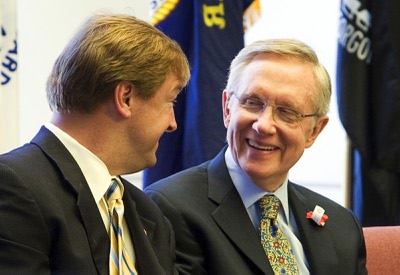
AP Photo/Susan Walsh
President Barack Obama gestures while speaking in the Rose Garden of the White House in Washington, Monday, Sept. 19, 2011.
Monday, Sept. 19, 2011 | 1:57 p.m.
Sun Coverage
A week and a half after unveiling his jobs plan, President Barack Obama has released a plan to pay for it and then some — largely through tax hikes on the wealthy.
The president’s proposal to cut the deficit by $3 trillion over the next decade continued the ongoing debate over how the nation should cut its deficit — with tax increases, spending cuts or some combination of the two.
Democrats and Republicans agree the tax code needs an overhaul. But if tax reform can’t happen right away, Obama said it’s time to ask everyone to “pay their fair share.”
Obama’s plan includes both cuts and tax hikes: For every $2 in cuts, it has $1 in new revenue.
The cuts come from reforming agricultural subsidies, “modest adjustments” in retirement programs Medicare and Medicaid, and by reducing by “tens of billions” the amount given to home lending giants Fannie Mae and Freddie Mac, which the government took over after the subprime housing bubble burst.
The revenue comes from allowing taxes on the rich to rise with the expiration of the Bush tax cuts.
“It’s not that anyone looks forward to the prospect of raising taxes or paying more taxes,” Obama said. “But we can’t afford these special lower rates for the wealthy, rates, by the way, that were intended to be temporary.
“This is not class warfare,” he said, anticipating the accusation House Speaker John Boehner and others would lob following the address. “It’s math.”
Obama’s plan would redefine baseline income for the wealthy, from $250,000 to $1 million, meaning only the top 0.3 percent of wage earners would see their effective tax rate rise. Under Obama’s plan, the overall tax burden on people in this income bracket would return to where it was during Bill Clinton’s presidency through the expiration of the Bush tax cuts and the elimination of tax breaks for luxury items.
“I reject the idea that asking a hedge fund manager to pay the same rate as a plumber or a teacher is class warfare. I think it’s just the right thing to do,” Obama said. “Those who have done well, including me, should pay our fair share in taxes to contribute to this nation that made our success possible.”
Obama’s plan steers clear of serious entitlement reform; it doesn’t include an appeal to raise the retirement age for Social Security, a change he had advocated this year.
Obama’s remarks were an appeal to Republicans, whose leaders have categorically refused the idea of bringing taxes into the equation — unless it’s to lower them across the board.
Obama’s speech and Republican reaction highlight the long-standing impasse that has kept Washington from passing a deficit reduction plan: Democrats think it’s time to let certain taxes rise, Republicans don’t.
But taxes aren’t the only thing Republicans object to in Obama’s plan.
Obama counts $1 trillion in cuts from the savings that will come as a result of the drawdown in the Afghanistan and Iraq wars — reductions Republicans have approved but have accounted for differently, not as part of their top-line math. Senate Majority Leader Mitch McConnell appeared to be complaining about this point when he accused Obama of proposing “phantom savings” in a statement released after the speech.
Nevada Republicans weren’t thrilled with the president’s plan either.
“In 2009, President Obama said that we should not raise taxes during a recession,” Sen. Dean Heller said in a statement on Obama’s speech. “I agreed with him then, and believe it is the right policy today.”
But Nevada Democrats defended Obama’s plan.
Sen. Harry Reid called Obama’s deficit reduction proposal “a concrete plan to cut the deficit ... and to do it fairly.” But Reid’s calls for fairness were worded less as plea for parity with the middle class on principle, than as a warning to Republicans that (to recite an adage) to whom much is given, of him much shall be required.
“More than anyone else these millionaires and billionaires benefited from Bush tax cuts that contributed $3 trillion to our deficit. They helped plunge this nation into a financial hole,” Reid said. “Those who benefited most from the policies that created our deficit should also help solve our deficit ... middle class, seniors and those who can least afford it will not bear the heaviest burden.”
Obama’s proposal might not hike his own taxes — his annual salary is $400,000 — but it certainly will affect people like Warren Buffett, the legendary investor who has been waging a public campaign to reform the tax code so the super-rich pay a higher share of their income in taxes. Buffett has said: “I pay a lower tax rate on much of my income than my cleaning lady does.”
Some Democrats have called the argument that millionaires shouldn’t pay a lower tax rate than the middle class “the Buffett rule.”
The president’s plan comes as the 12-member bipartisan deficit reduction panel — Sen. Harry Reid’s creation — has started to come up with $1.5 trillion in spending cuts — almost $2 trillion if the president’s $450 billion jobs plan goes through.
Nobody expected the rest of Washington to wait for the panel to finish its work. Democrats and Republicans in the White House, Congress and the on the campaign trail have been voicing their opinions about what should and should not be part of the ultimate plan.
Obama pledged to “veto any bill that changes benefits for those who rely on Medicare but doesn’t ask the wealthiest Americans to pay their fair share.”


Join the Discussion:
Check this out for a full explanation of our conversion to the LiveFyre commenting system and instructions on how to sign up for an account.
Full comments policy